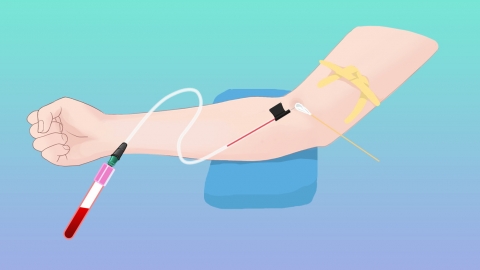What should I do if free thyroxine (FT4) is low?
Under normal circumstances, low free thyroxine (FT4) levels may be caused by insufficient iodine intake, aging, Hashimoto's thyroiditis, subacute thyroiditis, or post-thyroidectomy status. It is recommended to seek timely medical evaluation to determine the underlying cause and, under a doctor's guidance, improve the condition through lifestyle modifications, medication, or other treatments. Detailed explanations are as follows:

1. Insufficient iodine intake: Inadequate dietary iodine can impair the synthesis of thyroid hormones, leading to low FT4 levels. This is commonly seen in populations living far from coastal regions. Dietary adjustments should include moderate consumption of iodine-rich foods such as kelp and nori, using iodized salt during cooking, and avoiding long-term use of non-iodized salt.
2. Aging: With advancing age, thyroid function gradually declines, resulting in reduced thyroid hormone secretion and lower FT4 levels, particularly among middle-aged and elderly individuals. Maintaining regular sleep patterns, avoiding excessive fatigue, and engaging in mild physical activities such as tai chi or walking can help strengthen overall health.
3. Hashimoto's thyroiditis: An autoimmune disorder in which the immune system attacks thyroid tissue, impairing thyroid function and reducing thyroid hormone production. Symptoms often include fatigue and cold intolerance. Patients should follow medical advice to take medications such as levothyroxine sodium tablets, thyroid extract tablets, or Yikang capsules to supplement thyroid hormones.
4. Subacute thyroiditis: Thyroid inflammation triggered by viral infection causes temporary damage to thyroid tissue, reducing thyroid hormone release. Symptoms include neck pain and fever. According to medical guidance, medications such as enteric-coated aspirin tablets, ibuprofen sustained-release capsules, or prednisone tablets may be used to relieve inflammation and pain.
5. Post-thyroid surgery: Partial or total thyroidectomy performed due to thyroid nodules or goiter may leave insufficient thyroid tissue to meet the body’s metabolic demands, resulting in low FT4 levels. Long-term hormone replacement therapy with medications such as levothyroxine sodium tablets, thyroid extract tablets, or enteric-coated levothyroxine sodium tablets is typically required under medical supervision.
In daily life, maintaining emotional stability and avoiding excessive anxiety is important. A balanced diet rich in protein and vitamins should be maintained, with avoidance of extreme dieting or overeating. Dress appropriately according to weather changes to prevent colds. Comprehensive lifestyle management can support improved thyroid function and maintain normal metabolic activity.






